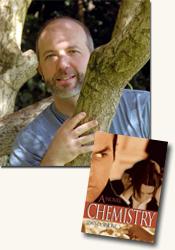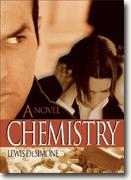author interview
book reviews:
· general fiction
· chick lit/romance
· sci-fi/fantasy
· graphic novels
· nonfiction
· audio books
· author interviews
· children's books @
curledupkids.com
· DVD reviews @
curledupdvd.com
newsletter
win books
buy online
links
home
for authors
& publishiss
for reviewers

|
|||||
 
Curledup.com contributor Michael Leonard conducted an email
interview with Lewis DeSimone, author of the recently released novel Chemistry Interviewer Michael Leonard: Chemistry deals with some pretty weighty and serious issues – depression, commitment, and death, HIV/AIDS, and intimacy between two men. Where did you get your inspiration for the novel, and what were you ultimately trying to show? Lewis DeSimone: Like most of my work, Chemistry was inspired by a conglomeration of things—events and people that had nothing to do with one another in the real world but demanded to be drawn together in fiction. I had known people suffering from depression and taking medication to deal with it, and I was intrigued by the whole notion that human behavior and mood could be so strongly influenced by chemicals in the brain. We tend to think of ourselves as basically happy or basically melancholy: that tendency, one-way or the other becomes a kind of prism through which we see the world and determines our perspective on life. If you could change it with a pill, then what does that say about personality, about identity? At one point in the novel, Zach says, “Some people have natural highs, I have natural lows. Big deal.” Essentially, he’s asking, “If I’m not depressed, then who am I?” So-called sanity means losing his sense of self.
I read a lot—clinical books as well as memoirs about depression. In addition, I asked a friend of mine who’s a clinical psychologist to read the manuscript for accuracy. I also had personal observations to fall back on—people I knew who had struggled with depression, their loved ones. It’s amazing how debilitating the disease can be. Hopefully, most people understand now that it’s not just a case of the blues: clinical depression can be quite overwhelming. It ruins lives. My research made me quite sympathetic to all involved, and I hope the novel reflects that. Part of the uniqueness of Chemistry is that it’s a love story between two men who suddenly find they are dealing with a crisis, which seems to spiral out of their control. Do you think that if a straight couple were faced with this that they would handle it any differently? No, not really. What’s unique about Neal and Zach’s situation is that they have been together for only a few months when all this starts to happen. They don’t even really know who each other is, and they’re nowhere near ready to make a commitment. So when Neal is suddenly confronted with the enormity of Zach’s condition, he’s torn. He fell in love with one man, and now he finds himself taking care of another, essentially. He’s had precious little of the good times, and suddenly he’s faced with an obligation far greater than he’d ever imagined.
If there’s one thing Neal is good at, it’s controlling his emotions. His innocence is largely the product of that control: he’s always been the good little boy, putting other people’s needs ahead of his own. You could call him codependent, but the flip side of codependence is compassion. And I think Neal takes to heart the literal meaning of compassion—“suffering with” someone. He isn’t even aware of this capacity, but I believe he gets spiritual strength from compassion. He gets hope. He gets the sense that life is a process, and that there are truths to be found, even in pain. In the end, I hope, Neal is a better person because of what he’s gone through.
Sometimes chemistry is completely inexplicable. Its just pheromones, nature’s way of getting people to come together. And there’s a bit of that at work with Neal and Zach: a purely physical attraction that they feel for each other even before they’ve opened their mouths to speak.
Writing them was easy. The hard part was anticipating my mother’s reaction.
I liked the way you characterized Neal and Zach's relationship as "a chemical reaction between two elements coming together to create something new…" What gave you the idea to use the chemistry of the elements as a metaphor for their relationship? The metaphor of chemistry, of course, takes various forms throughout the novel—from the brain chemistry that causes Zach’s depression to the romantic chemistry that brings him and Neal together. It wasn’t until the last draft of the book, however, that I added the layer of the chemical elements. It became a very useful unifying device, particularly in linking the very beginning of the book with the final scene. I do believe that a relationship is more than the sum of the people in it; bringing people together in such an intimate way creates something new—just as a heterosexual union can produce children, which represent a blending of their parents’ DNA. Any relationship that reaches a critical depth does change us, if only by making us more aware of ourselves.
No, I don’t think so. Zach uses his sexuality to find emotional comfort. As a child, he was abandoned by one parent and abused by the other, so he grew up believing himself unworthy of love. But he always knew that he was attractive, so sex becomes for him the way to get attention—it’s the one thing about himself that he’s sure people want.
In terms of their relationship, I think sex is pretty close to everything. As you’ve pointed out, they really have nothing in common beyond their physical attraction to each other. And when the sex fades—a side effect of Zach’s medication—Neal is finally able to see that there’s very little else there. They haven’t been together long enough for lust to give way to love—real love, the kind that sustains long-term relationships. There is a kind of spiritual connection, though—and that, I think, is what keeps Neal around. By experiencing compassion for Zach’s situation, he’s learning to feel compassion for himself, for who he really is. Zach allows him to get in touch with a forgotten part of himself, and that’s how he becomes whole. Can you tell us a bit about the secondary characters in the novel, particularly, Martin, Neal's best friend? Without giving any thing away of the end, Martin tells Neal some hard truths about the pain of sickness and love. Does Martin in fact become a type of catalyst for Neal's decision-making process? Martin gives the book some generational context: he’s the link to an earlier time, the heyday of gay liberation. He’s known the extremes of gay life—the complete freedom of the ‘70s and the tragedy of the ‘80s. Neal, on the other hand, came out into a world where AIDS was already a fact of life, so he’s been relatively untouched by either the highs or the lows. His life is all about maintaining control, keeping an even keel. He’s afraid of the extremes—joy as well as sadness. He doesn’t want to get his hands dirty, and Martin’s there to give him a reality check—to support him through his problems, but also to inspire him to take responsibility for himself and his decisions. Of course, no matter how well meaning your friends are, they can take you only so far; in the end, Neal has to learn for himself. He has to confront his fear and his pain in order to evolve as a person.
Because it has special meaning for me, I guess. From the minute I first saw San Francisco, I fell in love with it—to the point that now I can’t imagine living anywhere else, in America at least. It’s not just that San Francisco is a gay mecca; that’s only part of its appeal. This is a place of liberation, a place that encourages people to be who they are, a place where conformity is suspect rather than individuality. I’m proud to call myself a San Francisco liberal; I think San Francisco should be a model for the rest of the country. Also, while reading the novel, it seems as though Neal and Zach almost live and breathe within you. Is this so? How much of you does actually exist within these characters? That’s very flattering. For me, writing is an exercise in empathy. In order to create convincing characters, I need to put myself in their shoes, I need to imagine how I would feel if I had their background, their limitations, their experiences. With Neal that wasn’t so difficult; we have a lot in common— the sheltered childhood, the Ivy League education, a certain persnicketiness. I’ve never touched a cello, though, so I have no idea where his musical talent comes from.
Do you have any other novelists that you draw upon for inspiration while writing? And are you planning any upcoming literary projects, and if so, would you like to share them with us? My idol is E.M. Forster, though I can’t say that my style has anything in common with his. There’s an incredible balance in his work between wit and profound insight. All of his work, it seems to me, is about self-acceptance; his protagonists are all charged with fighting against social norms in order to express their authenticity. When you consider his own struggle as a writer—the fact that he never felt free to publish anything that truly reflected his own life as a gay man—his achievement is all the more remarkable. Since I live in a somewhat more enlightened time, I feel it’s my duty to write honestly and unapologetically about gay life.
And finally, what do you most want readers to remember about Zach and Neal's turbulent and stormy time together? And what do you think we, as outsiders to their affair, should ultimately take away from their story? I once heard Toni Morrison, one of my favorite writers, speaking about her process. She said that her novels always begin with a question, not an answer. And that was the approach I took with Chemistry: I don’t want to tell people what to think; I just want them to ask the right questions in their own lives. This novel is about self-discovery. It’s about learning to look at yourself honestly—without buying into social expectations. I think that, at one time or another, we all find ourselves playing a role: we behave as we think we’re supposed to behave. And like a lot of actors, we forget to stop playing the role when we leave the stage. We’re encouraged to go about our lives in a mechanical way—mindlessly, without looking into our hearts. I hope that Chemistry shows people the consequences of that kind of behavior and encourages them to be more willing to look inward and find their authentic selves. No one’s going to find him- or herself in my book or in any book, but hopefully I can inspire them to start looking. Lewis DeSimone was born and raised in Massachusetts. He earned a bachelor’s degree in English from Harvard University and a master’s degree in Creative Writing from the University of California, Davis. His short stories and poetry have appeared in Christopher Street, the James White Review, the Harrington Gay Men’s Fiction Quarterly, and the anthology Beyond Definition: New Writing from Gay and Lesbian San Francisco. He is also a regular contributor to Out Now magazine. Chemistry Contributing reviewer Michael Leonard interviewed Lewis DeSimone, author of Chemistry (see accompanying review), about his book for curledup.com. Michael Leonard/2007.
|
|||||
| fiction · sf/f · comic books · nonfiction · audio newsletter · free book contest · buy books online review index · links · · authors & publishiss reviewers |
|
| site by ELBO Computing Resources, Inc. | |

